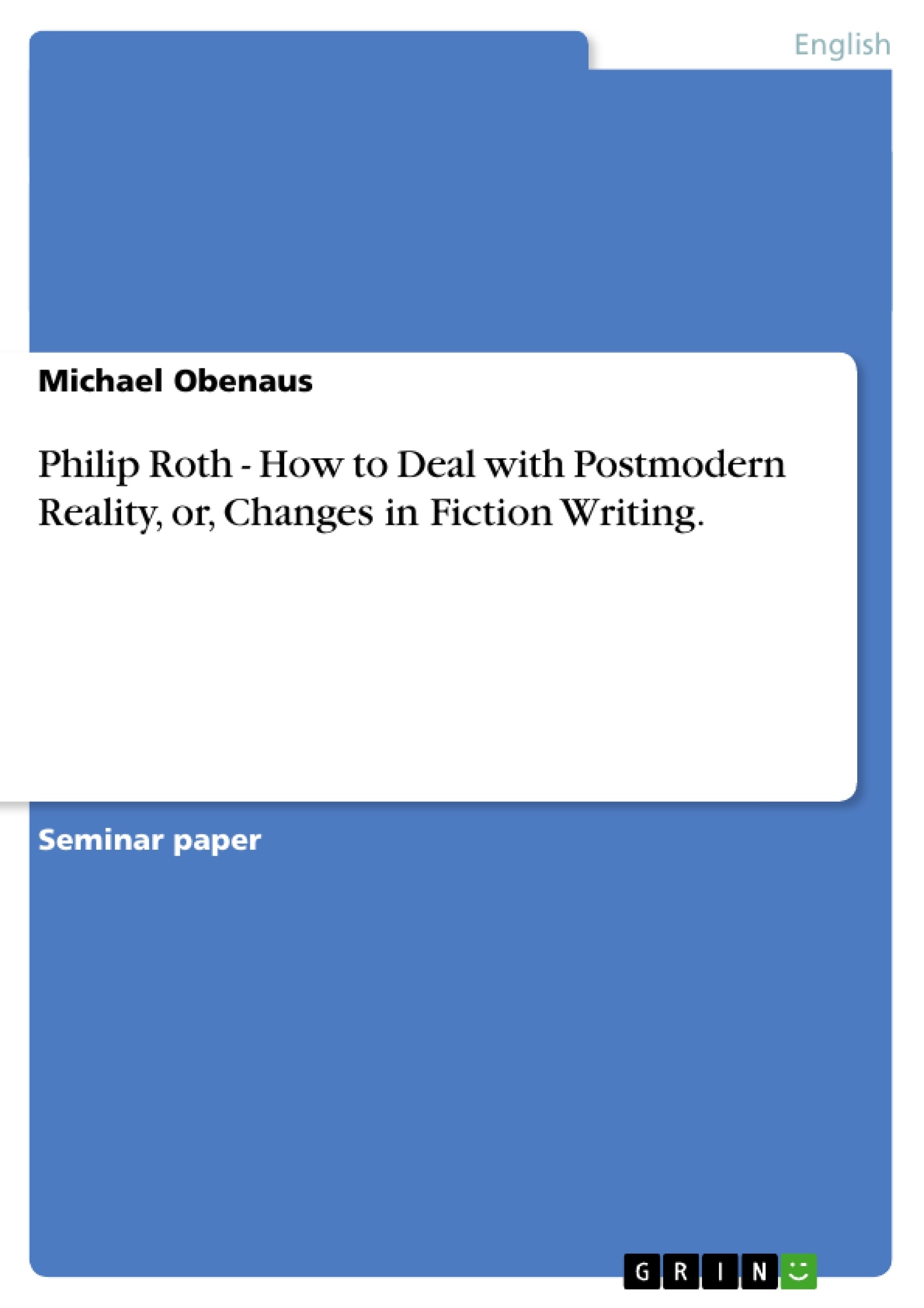“By now you are a walking text“ (FACTS, 162),
Zuckerman writes back to Philip Roth, having been asked whether or not Roth should publish his autobiography The Facts (1988). Zuckerman is one of the characters from Roth’s books, the hero of the trilogy Zuckerman Bound (1985) and some short stories. He is a fictional character whom Roth addresses in the prologue to The Facts, asking for advice concerning the publication of what Roth calls the result of “...writing a book absolutely backward, taking what I have already imagined and, as it were, desiccating it, so as to restore my experience to the original, prefictionalized factuality.“ (FACTS, 3)
Reading Philip Roth in a context of postmodern literature in America I have come to wonder what it actually is he himself is trying to do with his writing. Comparing Roth’s early narratives to more recent works I am tempted to say that a development can be observed towards an incorporation of narrative features which can be described as ‘postmodern’, i.e. that there are strong influences of a ‘postmodern reality’ in the work of Philip Roth, although he himself can probably not be called a postmodern writer in the strict meaning of the term. Here, of course, already appears a major problem for my assumption: What is ‘postmodern writing’ at all? Are there common features shared by (all) the representatives of postmodernism which could justify the application of such a classification? And if so, what precisely are these features and how can they be described?
Inhaltsverzeichnis (Table of Contents)
- Introduction
- Postmodernism – a Term
- Narrativity, Moral and a Writer's Responsibility
- Philip Roth - Writer and Reality.
- Changes in Fiction Writing: Identity and Priority
- Conclusion
Zielsetzung und Themenschwerpunkte (Objectives and Key Themes)
This paper aims to analyze the works of Philip Roth in the context of postmodern literature, exploring the influence of "postmodern reality" on his writing. It examines the relationship between writer and reality, the distinction between fiction and reality, and the development of Roth's work over time.
- The influence of postmodernism on Philip Roth's writing.
- The relationship between writer and reality in fiction writing.
- The evolving nature of reality and fiction in contemporary literature.
- The development of narrative features in Roth's works.
- The changing role of the author in postmodern literature.
Zusammenfassung der Kapitel (Chapter Summaries)
The introduction establishes the context for the analysis by examining the blurred lines between reality and fiction in Roth's work, particularly in relation to his autobiographical novel, "The Facts." It highlights the challenge of defining postmodern writing and explores the evolving relationship between writer, reality, and audience in contemporary literature.
The second chapter delves into the complexities of defining postmodernism, acknowledging that it is more a descriptive pattern than a prescriptive category. The chapter emphasizes the difficulty of applying the term to individual works and authors, highlighting the limitations of applying such a broad label to a specific literary movement.
The third chapter explores the role of narrativity, morality, and a writer's responsibility in shaping the relationship between fiction and reality. It delves into the ethical considerations inherent in creative writing and the writer's obligation to engage with their own reality.
The fourth chapter focuses on Philip Roth as a writer and his relationship to reality, examining how his work embodies the complexities of this relationship. It explores how Roth's writing reflects the changing social landscape of the 20th century and the challenges of portraying reality in an increasingly complex world.
Schlüsselwörter (Keywords)
The central keywords and themes explored in this work include postmodernism, postmodern reality, fiction, reality, author, narrator, narrativity, moral, responsibility, American literature, Philip Roth, "The Facts," and the development of narrative features in contemporary writing.
- Quote paper
- Michael Obenaus (Author), 1998, Philip Roth - How to Deal with Postmodern Reality, or, Changes in Fiction Writing., Munich, GRIN Verlag, https://www.grin.com/document/23528




